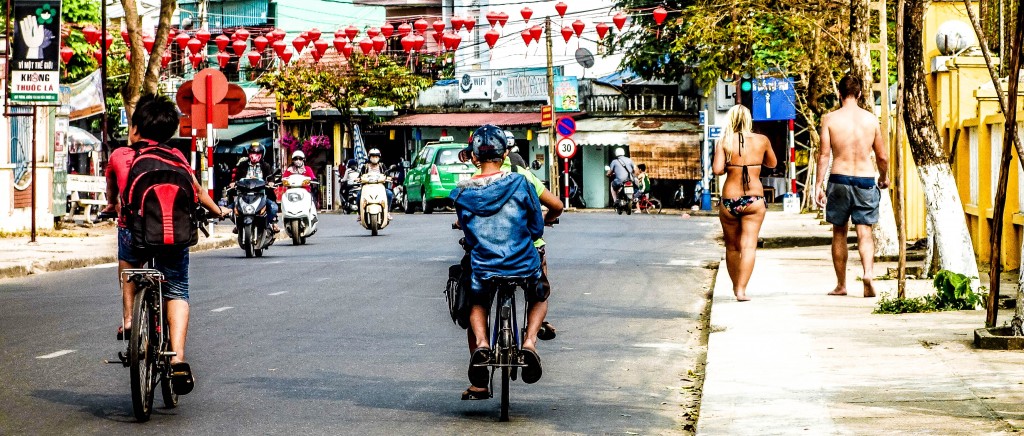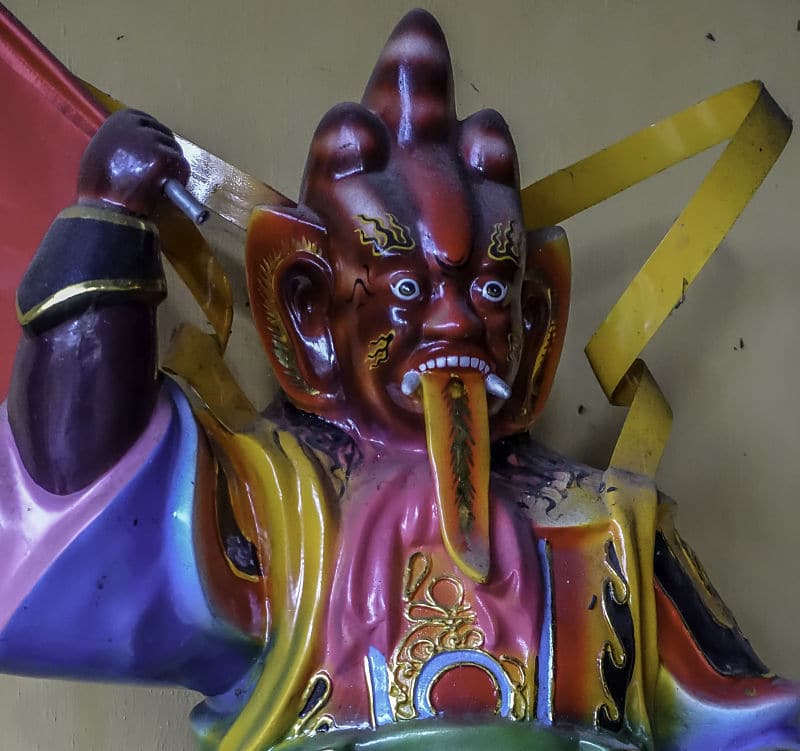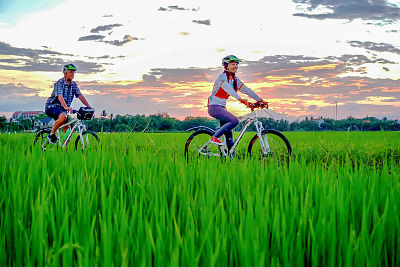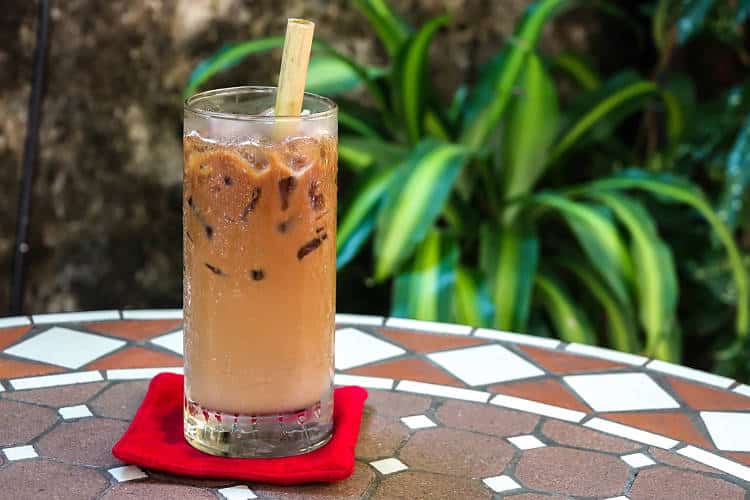Updated November 2022
Travel safety in Vietnam is something to be aware of, even if you’re an experienced traveler. Vietnam is a safe and welcoming country and tourist scams are at a minimum but like every country on Earth, that doesn’t mean they don’t happen. Brushing up on cultural preferences and being aware of potential scams are a must so read our top 10 Vietnam travel safety tips and ensure your holiday is free from unpleasant surprises.
Covid-19 has been well controlled in Vietnam with low case numbers compared to other countries. Covid-19 is still around as it is in most countries but travelers no longer need to have evidence of vaccination or a recent negative test result to enter the country. See the ‘Covid-19’ section below for more detail as well as the FAQs at the end of the post.
Vietnam Travel Safety Tips
Dress sensibly
There are no strict rules on dress in Vietnam but use local people as your guide. T-shirts and shorts are okay almost anywhere, but it’s preferable to wear longer trousers and cover your shoulders if you’re visiting temples and other holy places. Likewise, bikinis and swim-shorts are fine on the beach, but refrain from dressing scantily in towns or on the street. Always have respect for local culture – why attract unnecessary attention to yourself? And no one really wants to see your horrendous backpacking tattoo anyway.

Hydrate
An obvious but essential Vietnam travel safety tip – given the heat can push 40 degrees for long periods of the year, it’s incredibly easy to become dehydrated, even if you’re a renowned water-guzzler in your home country. Don’t leave home without a big bottle of water – sunstroke can happen really quickly and wipe a few days of your holiday off. Doubly important if you’ve been hitting the rice wine with gay abandon.
Stay calm
Saving face is a big part of Vietnamese culture, and losing one’s temper is frowned upon. It will look especially bad coming from a foreigner, and won’t win you any friends. As a result, Western concepts such as road-rage are virtually non-existent in Vietnam, even though the roads may appear chaotic. If you find yourself in disagreement with anyone, leave your own culture at home – stay calm, smile, apologise and walk away.
Tourist scams in Vietnam
Do some research, check the price before you accept a service, and you’re unlikely to find yourself the victim of a tourist scam. Book taxis in advance, use recommended shops and services (a quick Google will give you a good idea of where to start), and if in doubt, write down the agreed price as soon as it’s given.
Remember also that Vietnam has a bartering culture. However alien this might appear to foreigners, bartering is NOT a tourist scam and will even take place between locals who buy from the same person at the same market every day.
Prices for foreigners may start much higher than a seller will actually accept so be prepared to smile and haggle with no obligation to pay. Also, remind yourself how much more fun it is to converse with a single person rather than plonking an overpriced item down on a conveyer belt and having no choice but to pay what the label demands to some faceless billion-dollar business.
Don’t flash your cash
Firstly, it’s not culturally acceptable to show off a big wad of money. Secondly, it’s very, very silly. Although the country as a whole is very safe, bag snatches do occur in the bigger cities, as they do in all countries around the world. Showing how much money you have is an additional way of asking for trouble. Furthermore, if you’re attempting to barter for a particular gift or item, you won’t stand a chance of getting the price down if you’ve just loudly proven that you can afford the asking price and then some.
Avoid heavy petting in public
Displays of affection in Vietnam – even between married couples – are usually saved for private places. People are unlikely to mind if you give your nearest and dearest a kiss or hug in public, but avoid big displays of affection – again, why draw attention to yourself? Save that gargantuan snog you’re both hankering for until you get back to your hotel.
Motorbikes & road rules
Roads and driving etiquette are hugely important aspect of travel safety in Vietnam. First things first; Vietnam has one of the highest death rates in the world through motorbike accidents. Even if you drive a motorbike back home the rules here are not the same. Another issue is related to insurance. Unless you have a Vietnamese motorbike license, you are usually not properly covered, even if your insurance company assures you that you are.
For more information, read our guide to Vietnam road rules here.
Take special care when crossing the road, even at designated crossing points – traffic may not always stop. If you’re new to Vietnam, learn from local people – wait with a local person and cross alongside them. Committing to your road cross is more effective than a hesitant stop-and-start – keep to your line and motorbikes will simply weave around you.
Travel insurance
You won’t need travel insurance to get a tourist visa in Vietnam, but you’d be crazy not to arrange some before you arrive. A general travel insurance policy will cover you for flight delays and loss of luggage or possessions, and most importantly you’ll avoid a massive bill if you get sick or have an accident.
Read our full guide to travel insurance in Vietnam here.


Stay on the beaten track
Vietnam’s beautiful countryside is largely safe, but use common sense. You’re unlikely to encounter any problems cycling on country roads through villages and rice fields but bear in mind that, in some places, streetlamps and signposts may be few and far between. Give yourself enough time to get back by daylight.
If you’re planning on going off on a long hike it’s best to stick to designated routes and with local experts. Some areas in Vietnam are still at risk from unexploded devices dropped during the American war, so straying from the beaten track is inadvisable.
Vietnam after dark
As with most places in the world, the vibe of a place can change once the sun goes down. Some of Vietnam’s major cities carry on late into the night, but other cities and towns may quieten down earlier than you’d expect. If you’re planning on staying out late, plan your trip home before you go. What may seem like a busy town by day may become incredibly remote at midnight.
Be careful when using motorbike taxis at night, unless you’ve pre-booked a Grab. A different breed of driver can emerge on the streets at night, so stick to the safe option. Bear in mind that even reliable taxi companies may refuse a short journey if it’s not financially worth their while. Enjoy your holiday, but don’t take unnecessary risks.
Covid-19
Since September 2022 you no longer need to provide a negative COVID-19 test result or a vaccination certificate to enter Vietnam. Airlines may have different requirements. You’ll need to isolate if you contract COVID-19 in Vietnam, however, and you’ll need to closely monitor your health if you’re a close contact. Public health measures (such as social distancing and mask-wearing) are in place, but vary between provinces and could change at short notice.
Safety & Scams in Hoi An
Hoi An is a small community so scams are nowhere near as rife as you may find in the larger cities. But you still need to be cautious, especially late at night and even more so if you have been drinking. For instance, if you’re a female and think riding alone at night along the rice fields will be okay, have a re-think. More than likely nothing will happen to you but there are those odd occasions where they do. So just be careful, always cautious and all will be well.
Follow our top 10 above plus the links to our tips & essentials, plus our tried-and-tested chemists, shops, transport and market prices and you won’t go far wrong.
Frequently Asked Questions
Yes! Vietnam is a safe and friendly country to travel in. But use common sense. Dress appropriately. Avoid remote areas (especially at night). Exercise caution when using taxis and public transport. Don’t get drunk and fall asleep in the road.
Vietnam is a safe country for travelers. There’s a good infrastructure for public transport and most places can be reached with ease. Like every country in the world, there’s a small number of pickpockets and people who will try to scam you. Do your research. Use official tour companies and taxis. Agree prices in advance. Keep your possessions close to you. Respect local culture.
Do a little research before you go. Learn about the local culture and make sure you act accordingly. Research tour companies and public transport routes before you book anything. Don’t draw unnecessary attention to yourself. Be friendly and polite – a few local phrases will go a long way. Use common sense and don’t take unnecessary risks. Follow our top 10 Vietnam travel safety tips and you’ll give yourself the very best chance of staying safe in Vietnam.
No, this requirement was dropped in September 2022.
Generally no, but masks are often required in public spaces and at arranged gatherings.
Positive COVID-19 cases in Vietnam are required to self-quarantine until tested negative. The application of the quarantine rules, however, may be subject to the current situation of COVID-19 in each city or province. For example, some provinces may require a 7-day isolation period.

Wow. Excellent information, and accurate. I lived in Hoi An for 3 years and vouch for the information.
Every tourist should read this article.
Great job.
Thank you for such great feedback Dan. It is really appreciated.
Thank you for this helpful information. I was surprised to read that you have had many negative reports about Dr. Tran Quang Dung Medical Clinic, 503 Hai Ba Trung. As an Intrepid Travel tour leader, I have known Dr. Dung for over 20 years, and have called on him many times to treat foreign tourists for a range of medical conditions, and even on a few occasions for myself. I cannot recall anything but favorable comments about Dr. Dung from all the many people he treated. Some years ago, he was very upset because someone had just allegedly written critical comments about him on Trip Advisor, which he said were wrong and malicious, although I don’t know the details.
Hi Bruce, thank you so much for taking the time to comment. It’s good to hear positive feedback on Dr Dung. We had him on our site for some time even though we received many complaints about his ‘overcharging foreigners’ and his ‘arrogant manner’. We kept him listed for two reasons, there are few doctors who speak good English in Hoi An and some people were positive about him. We even kept him on after I’d been to see him and found him to be exactly as others had described. In an attempt to be balanced we mentioned that whilst he had received negative complaints he had also received good reviews from expats that lived in Hoi An. Unfortunately though, the complaints kept coming, they outweighed the positive so we removed him. Be assured we are simply reflecting the view of many complainants. Again, thank you.
Another great and useful read..thank you!
I should like to thank the many people, visitors, local traders and police officer who helped me this evening. in the Old Town when my wife became ill.
I WOULD NOT like to thank the greedy taxi drivers who walked away when I showed them where we wanted to go or wanted to charge us double the normal rate. A complete rip off.